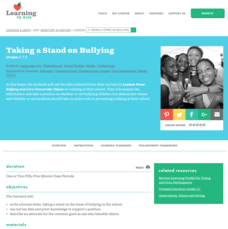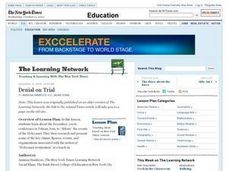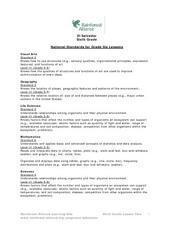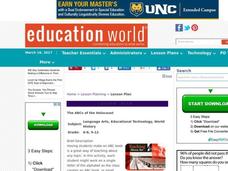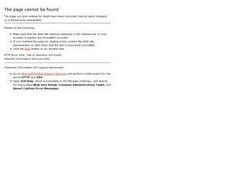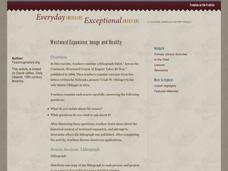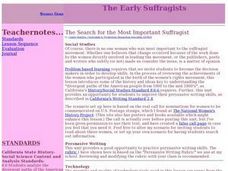Curated OER
Identifying and Using Parallelism and Balance in Literature
Analyze the use of balanced sentences and parallelism in a narrative. Included in this resource is a narrative about serving as a Peace Corps volunteer in Kazakhstan titled, "The Train Ride Home". Middle and high schoolers review...
Curated OER
Taking a Stand on Bullying
Middle schoolers stand up against bullying in a character-building lesson. After discussing historical figures who became advocates in times of adversity, they brainstorm ways to end bullying at their own school, and use a formal letter...
Curated OER
Letters from the Heart: Designing for the Other 90% of the World's Population
Students explore varied aspects of the design process and learn that most products are designed to reach the worlds wealthiest 10%. In this lesson, students work in groups to learn ways in which designers are attempting to rectify this...
Curated OER
Thank You Notes
Students investigate the history of presidential proclamations and develop their own Thanksgiving Proclamations, highlighting current issues and sentiments.
Curated OER
Time's Up
How was your year? Create an individual timeline that document learners' personal history from the previous year. After reading an article about celebrating New Year's in Japan, pairs interview each other to gather information about...
Curated OER
Why Are Thinning Trees Important?
Students investigate thinning trees and why they are important to the forest. In this sustainable environment lesson plan, students role-play as if they are trees in the forest and simulate the overcrowding and inability to move spaces,...
Curated OER
Letters From The Diaspora
Students investigate the concept of mass migration and conduct research using a variety of resources. The information is used in order to create letters written from the perspective of a person who may have migrated during the time period.
Curated OER
Denial on Trial
What is the "Faurisson Affair”? What is “Holocaust Revisionism”? What does freedom of speech entail? Do revisionists have a right to voice their ideas? Such questions are at the heart of a richly detailed, thought provoking lesson...
Curated OER
Justice Is Blind, Colorblind That Is
It's so interesting to see kids respond to articles about education. To start the day, prompt learners to discuss the words colorblindness and diversity. Then, split your class in two and have one side read an article from 2007 and the...
Roy Rosenzweig Center for History and New Media
The Boston Massacre: You Be the Judge!
The importance of considering multiple perspectives of the same event is the big idea in this exercise that focuses on the Boston Massacre. Class groups examine photos of four depictions of the massacre, an English and an American...
Curated OER
El Salvador: Whose Breakfast Isn't for the Birds?
Sixth graders investigate the understanding of where coffee is grown by conducting a survey. They study the natural history of coffee and examine bird habitats in the areas where coffee is grown. They write letters to explaining the...
Curated OER
The Question of Annexation
Learners examine the sequence of events that led up to the annexation of Texas to the United States. They create a timeline of significant events, analyze primary source letters from this time period, and write a letter from the point of...
Curated OER
The ABCs of the Holocaust
The ABC book format is used to organize information found in a Holocaust research project. Class members use the library and/or online resources to collect information and organize their findings under key terms, places, or names. Before...
Curated OER
Reading Primary Source Documents: Historical Content
Why do we read primary source documents? What can they give us that other writings cannot? Provide your learners with any of the primary sources attached here (there are seven), and have them complete the graphic organizer (which opens...
Museum of Tolerance
Immigration Journeys
Through the journey of four stories of immigration, scholars complete graphic organizers and apply knowledge to create a visual representation of their findings on a large poster. Third and fourth readers write a letter to their family...
Roy Rosenzweig Center for History and New Media
Westward Expansion: Image and Reality
As your young historians study Westward Expansion, practice in-depth primary source analysis with the documents and guidelines presented in this resource. They will examine a lithograph and excerpts from two letters written by a Nebraska...
Curated OER
Meet Hannah the Weaver
Students analyze primary and secondary sources to explore slavery and emancipation, and write letter or diary entry from point of view of slave Hannah Harris or plantation owner Robert Carter. Students then dramatize their creative...
Curated OER
The Original's Sins
Are history textbooks plagiarized? The New York Times article, “Schoolbooks Are Given F’s in Originality,” looks at this question and forms the basis for a lesson on textbooks and plagiarism. The very detailed plan includes resource...
Curated OER
History's Mysteries
Students propose a theme for an upcoming program on the History Channel, select a historical theme for the investigation, resarch topics that support the theme, and write a proposal to the producers of a television program.
Alabama Department of Archives and History
Montgomery Bus Boycott: We Would Rather Walk!
Have historians use primary sources to learn about the circumstances and implementation of the Montgomery Bus Boycott, and think about the issue of boycotts as a means of effecting social change. Wrap it up with a letter to the editor...
John F. Kennedy Presidential Library & Museum
Ask Not What Your Country Can Do for You
Ask not what the instructional activity here can do for you, but what you can do with the instructional activity. The answer is quite a lot! Young scholars revisit JFK's famous inaugural address with a focus on his plea for civic...
Scholastic
Voyage on the Mayflower for Grades 6–8
Imagine living in the hold of a sailing ship for 63 days, enduring rough seas and autumn storms. As part of a study of the voyage of the Mayflower, class members examine an online resource that details life about the ship, watch a slide...
Curated OER
The Scoop on Local Business
How do local businesses support their state or regional economy? The New York Times has prepared another great lesson for your class. They begin by listing products grown or manufactured in their state or region then write interview...
Curated OER
The Early Suffragists
Pupils research early suffragists in an effort to find the most influential leader of the movement. They give presentations and the class chooses a winner. They write letters to the postmaster suggesting they be placed on a stamp.
Other popular searches
- Esl Informal Letter Writing
- Writing an Informal Letter
- Writing Informal Letters
- Informal Letter Writing Form



